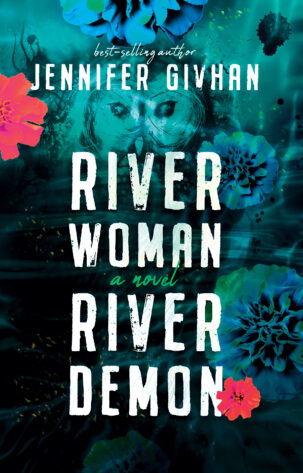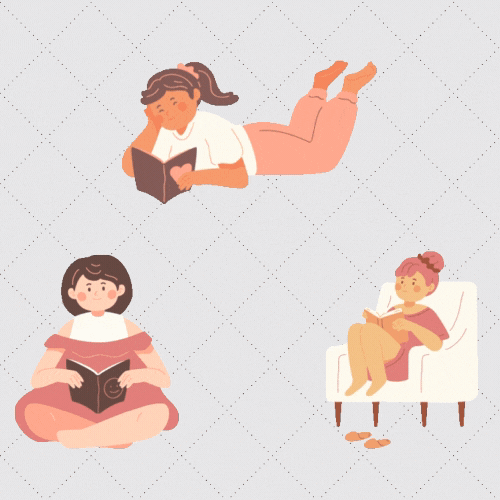Happy Tuesday everyone!! We are delighted to be interviewing Jennifer Givhan, whose new book “River Woman, River Demon” releases today! If you are looking for a book to read for the Hispanic Heritage Month, look no further!!
 River Woman, River Demon by Jennifer Givhan
River Woman, River Demon by Jennifer Givhan Published on October 4, 2022 by Blackstone Publishing
Pages: 330
Purchase Links*:







Genres: Fiction / General, Fiction / Magical Realism, Fiction / Thrillers / Psychological, Fiction / Thrillers / Supernatural, Fiction / Thrillers / Suspense, Fiction / Women

"Award-winning Mexican-American and Indigenous author Jennifer Givhan brings us an exquisitely written, spell-binding psychological thriller―weaving together folk magick with personal and cultural empowerment―that is perfect for fans of Mexican Gothic.
When Eva's husband is arrested for the murder of a friend, she must confront her murky past and embrace her magick to find out what really happened that night on the river.
Eva Santos Moon is a burgeoning Chicana artist who practices the ancient, spiritual ways of brujería and curanderisma, but she's at one of her lowest points--suffering from disorienting blackouts, creative stagnation, and a feeling of disconnect from her magickal roots. When her husband, a beloved university professor and the glue that holds their family together, is taken into custody for the shocking murder of their friend, Eva doesn't know whom to trust--least of all, herself. She soon falls under suspicion as a potential suspect, and her past rises to the surface, dredging up the truth about an eerily similar death from her childhood.
Struggling with fragmented memories and self-doubt, an increasingly terrified Eva fears that she might have been involved in both murders. But why doesn't she remember? Only the dead women know for sure, and they're coming for her with a haunting vengeance. As she fights to keep her family out of danger, Eva realizes she must use her magick as a bruja to protect herself and her loved ones, while confronting her own dark history.
A psychological thriller that weaves together the threads of folk magick with personal and cultural empowerment, River Woman, River Demon is a mysterious incantation of reckoning with the past and claiming one's unique power and voice."
Hi Jennifer! Thanks so much for taking the time to do this! We are delighted to host you in our blog! What inspired you to write this story?
Several events from my personal and familial turmoil eventually morphed into this story, including an accusation against my husband, a Black man; this charge, although dropped, shook our relationship to its core.
It’s also inspired by early motherhood, during which I suffered severe post-partum depression that bordered on post-partum psychosis at times, but there is such a stigma against mental illness and such a paucity of awareness and resources for mothers struggling through these issues that I was terrified to talk about my experiences for fear of repercussions or outside intervention. This filled me with shame and dread; I felt isolated and alone, disenfranchised and disempowered, much like Eva at the onset of RIVER WOMAN, RIVER DEMON. Now, I am an advocate for and write with vulnerability about protagonists with mental illnesses because it’s vital to break the stigma, especially for folks of color.
One surprising thing that helped was reading dark psychological thrillers because I saw women going through painful, difficult situations and sometimes making terrible decisions, yet speaking with such candor. So-called unlikeable women. Bad mothers. I soaked them in; dozens of psychological thrillers as, somehow, I knew I wasn’t alone and that having dark thoughts and demons doesn’t make us dark or terrible. It just makes us human. It just makes us alive.
But I kept noticing that the protagonists were white women, often affluent, often in a major city, often on the east coast. I didn’t see myself, my mom, or comadres and women who looked, talked, acted, or felt like we did about family or culture, for instance, who didn’t necessarily grow up negotiating the tensions between culture and mainstream. So even though I saw something integral to destigmatizing mental illness in women and mothers in particular, even though I was excited by the possibility of women getting to act irreverent and bitchy and sometimes even full-on antisocial in every capacity, I didn’t see this same permission given to women of color and Latina/indigenous women in particular.
So I wrote us into the genre.
This is my version of a Chicana Girl on the Train.
Can you describe the book using five (or less) adjectives?
Witchy, haunting, magickal, bone-chilling, empowering.
Which was your favorite scene to write?
Everything ghosted. I’ll likely include hauntings in every novel from here on out. They’re a delight to write! Magical realism and surrealism are my jam, but the ghosts in RIVER WOMAN, RIVER DEMON are complex characters in their own rights, and I truly enjoyed writing them.
Which was the most difficult one?
Anything legal, police procedural, or courtroom. I had to do quite a bit of research to make these scenes believable since I don’t have professional experience in these areas. But I’m grateful for the writing experience I now have, and several readers have asked for a La Detective spinoff because they loved her so much in RIVER WOMAN, RIVER DEMON—so I’ve been envisioning a story for her that I hope to write soon!
Tell us about the research you did for this book. Was there something you researched that didn’t make into the final copy?
Eva is a bruja whose spirituality comingles with my own, so I knew much about her magickal practice already and didn’t need to research that (rather, I’ve been researching brujería and folk magick for my own personal and familial spiritual life for many years, so these became an organic part of the novel), but Eva is also a glassworking artist, and I didn’t know anything about making glass until this novel. I watched quite a few YouTube videos and tutorials about how to create these gorgeous, intricate sculptures from glass, and although I could never do it IRL (I would absolutely burn myself and shatter everything!), it was tremendous fun to write Eva creating this artwork on the page.
I did look up quite a bit about owls for the novel (you’ll see when you read RIVER WOMAN, RIVER DEMON the symbolism of owls) and other animal life around the Río Grande, though not all of the wealth of information I learned from field guides made it into the novel. Once I go down the rabbit hole of learning about the places I love, I can read for hours on end about plant and animal life! It’s so fascinating! In fact, I often research the scientific and psychological evidence behind whatever I’m writing about, even folk magick, spirituality, and belief. This information was crucial in my novel TRINITY SIGHT, but I often allow the images and characters to suffuse these meanings metaphorically rather than outright in my subsequent novels.
Do you write in silence or while listening to music?
Because I’m a mama writer (and I wrote RIVER WOMAN, RIVER DEMON while homeschooling my kids through the pandemic), I have to carve out writing spaces whenever and wherever I can—so this answer varies. But I love listening to classical music with deep atmosphere and have a “thriller soundtracks” playlist, which includes music from Nick Cave and Warren Ellis’ score to THE ROAD, my favorite of which is the song with the same title. I wrote most of my novel JUBILEE to that song on repeat.
How about snacks?
Salty and sweet mix. Anything crunchy. Lemon heads or hot tamale candies are a go-to, but chocolate pretzels do the trick too! And caffeine!
You have written quite a lot of poetry. Which one do you prefer to write?
As a poet and novelist, I’m often asked how my two crafts inform each other.
I’m a poet at heart, and I have often discussed elsewhere how taken I am with Julia Kristeva’s theory of the semiotic, prelinguistic chora space of humming and crying and guttural noises and communicating beyond “meaning making” as a child/mother through the womb or in the newborn stages—how I tap into this realm in my poetics. The same is true for the process of creating my poems, and as a woman with chronic illness, I often find myself in a state of exhaustion and/or brain fog (fibro fog). Perhaps because I’m a poet at heart and partly because I’ve dedicated my life to studying the craft of poetry, creating poems never feels like work—but freedom. Release, play, heartwork in its purest form. This is not to suggest I don’t craft and sculpt and revise a hundred times in a hundred iterations. I do. But it’s the kind of soul work that revitalizes, strengthens, and buoys me so I can return to the other work—the novels and the rest of my life. And when I’m not writing poetry, I don’t beat myself up because I know that, like any true love, poetry will never leave me, nor I it.
The heart of my novels is likewise poetry. The deeper themes and resonances, the humanity buzzing and humming in the characters and their relationships and desires and fears and resulting choices for better or worse, the beating heart at the center. But the puzzling it all together, creating believable dialogue that moves the story forward and keeps the pacing clipped and the reader turning pages—all of this I’ve had to teach myself again and again because it does not necessarily come as naturally to me, and I’ve found I’ve had to forgive myself and be patient with myself. An analogy that’s helped me lately is that the writing process can be akin to a child happily at play with building blocks, stacking one atop the other contentedly. One block at a time.
Are you working on a new book? (if you are allowed to say so😊)
I am! Two new books, actually!
My daughter and I are nearly finished with our quantum leap revisions to our middle-grade novel, PI LUNA, which is our indigenous girl-powered Percy Jackson-esque journey. I think YA readers are going to love it!
And I’m working on my next novel, SALT BONES, which takes place along the border where I grew up, dealing with the eco-crisis of the Salton Sea. SALT BONES is a chilling and trenchant retelling of Demeter and Persephone from the Mexicali borderland, a mother/daughter reclamation in the face of violent misogyny and an ecological threat.
Thank you so much once again Jennifer, we can’t wait to read the book!
We’d like also like to thank Katelynn Dreyer, who approached us in order to promote Jennifer’s new book!



